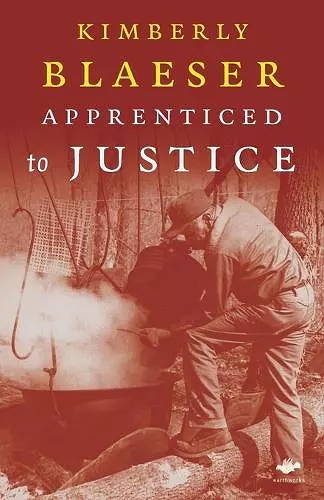Apprenticed to Justice
Format:Paperback
Publisher:Salt Publishing
Published:28th Feb '07
Should be back in stock very soon

The poems in Apprenticed to Justice are a sublime combinaton of literary indulgences echoing booted feet on still frozen ground, turtle rattles, a flushing of cranes, or antler dangles near ears. Sweet maple sap and hazelnut eyes. Gelatin tadpoles and bullrush psalms. These poems bring the snowblind tumbling into dimension. Northern lights and doppelgangers. Excrement and cleansing. They warm valleys with buttercups; recite names invoking reason. They shoot meaning into madness with the subtle elegance of Anishinaabe style. Kim Blaeser is a knock-out poet, bringing boxers to steal hearts, floured fists to punch dough, and a serious sense of familial White Earth beauty, hunger, and humility that's impossible to put down. Voles scuttle where crooked knuckles clench our very souls. This is an impressive and accomplished collection of poetic delivery we can truly feast upon. A necessary full copper voice. A balance in the tilt of the world. -- Allison Hedge Coke This is a gorgeous book. It's musical and strange. I have already spent much time with Kim Blaeser's new poems and I will keep reading them in the years to come. -- Sherman Alexie These poems are alive to every nuance of possibility in the natural world, every subtlety of connection between human beings and their environment. What makes the poems so powerful is not just the exactness of each detail, but the shimmering around the edges of things evoked, the "third form between," the element that just eludes the eye. Blaeser bears witness to the fleeting and mutable - 'tadpole becoming frog, snowman in the process of thaw' - but also to a strong and certain knowledge gained by lifelong 'apprenticeship', a knowledge earthed in silence as much as in language: 'Not meaning / but almost, / not saying, / but the breath before.' Blaeser shares ... a unique vision that is at once personal and interwoven with the communal, the historical. There is humour here, as well as serious critique ... This is a sure-handed work of impressive maturity and beauty. -- Tracy Ryan
Through detailed images of ancestors and wilderness places, through renderings of story, tribal history, and family ritual, award-winning Anishinaabe author Kimberly Blaeser explores our mesh of tangled origins.
Apprenticed to Justice is a collection of vividly rendered lyrical and narrative poems that trace the complex inheritances of Indigenous America, this “strange map drawn of blood and history.” It opens with intriguing glimpses of individuals—a mother “born of dawn / in a reckless moon of miscegenation,” cousins “who rotated authority / on marbles sex and skunk etiquette,” women “planting dreams with dank names like rutabaga and kohlrabi”—and it turns on the notion of legacy. From what dark turmoil of earth do we emerge? How and what do we inherit? To what mesh of tangled origins do we live apprenticed? These are the literal and the metaphorical questions Anishinaabe author Kimberly Blaeser asks in this, her third collection of poetry.
Grounded in rich details of places from the Boundary Waters Canoe Area Wilderness to the arctic region of Kirkenes, Norway, the poems link the people and the landscapes through storytelling. Narratives range from the comedy of a missing outhouse floor to the longing for the return of an MIA. The storied landscapes of the poems, the “Rocky bottom allotted land(s) / twenty-eight slow horse miles / from the village store,” also become intertwined with tribal history. And the remembered tribal accounts of scorched earth campaigns or the Trail of Tears in their turn become enmeshed with contemporary justice issues including Potlatch’s relentless clear cutting of forest lands and the strange cannibalism inherent in Sr. Inez Hilger’s study of “other” cultures like that at Blaeser’s home, White Earth Reservation. Ultimately, attention to these justice issues invoke the lives of tribal elders whose figurative “fragile houses / pegged at the corners with only hope” somehow represent and teach survival. Finally, each movement in the book connects back to the act of writing, to the poems themselves as both remembrance and a kind of revolution—“these fingers / drumming on keys.”
ISBN: 9781844712816
Dimensions: 216mm x 140mm x 7mm
Weight: unknown
120 pages